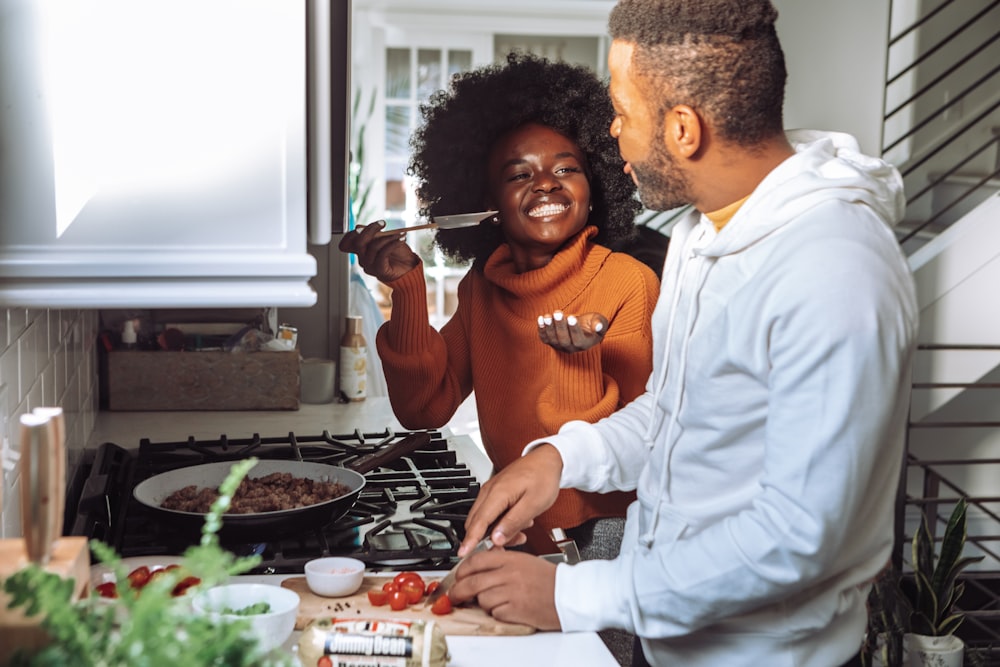We all know how relationships usually start: you talk a lot, you kiss a lot, you spend a lot of time cuddling in bed together, whispering speak nothings…
Everything is new and fresh, and there’s a lot to say. You want your new partner to know everything about you, and the communication flows easily.
But after some time, all of that can get more complicated. Time together can start to feel routine or distant. Life gets more stressful and difficult, separately and together. Arguments happen. Resentment brews. Deeper character traits, past trauma and personal fears start to surface in subtle ways. All of this is very common and often comes with the territory while you grow as a couple, encounter adversity and figure out who you each are.
Being in love is incredible, but no one ever said it was easy.
All those talks over Sunday morning coffee in bed and long road trip vent sessions can get stunted and shadowed by more conflict and confusion.
The key to keeping your relationship strong is communication.
Lack of it can lead to nasty consequences like the inability to listen to each other or frequent arguments. If you’re starting to feel a blockage, distance or constant disagreement, don’t ignore that. Address it now!
We’re here to help.
Why lack of communication happens:

Problems with communication in couples can often happen when the relationship becomes routine or distant. You find yourselves circling back to the same brief discussion about work, the kids or your days and then go on as separate people without taking the time to connect on what you’re both really feeling or thinking.
Another big communication barrier is conflict. It’s when you and your partner don’t resolve a conflict or series of conflicts, and then you end up arguing over the same problems again and again. These can be trivial things, such as who will cook dinner or how much money should be spent on a new TV set. Or they could be big things, like why you chose to move to a new city for one of your jobs or whether it’s time to make big relationship changes.
How it’s impacting you and your relationship:

Firstly, lack of communication can lead to distance and a lack of intimacy as partners. You don’t know how the person you love is feeling, and they don’t know how you’re feeling.
It’s lonely, even in a relationship.
It can also lead to fights, which may end up in separation and break-up, or at the very least, make both of you unhappy and negatively impact your mental health.
A partner should ultimately make you feel more understood, safe and loved, not the opposite. And sometimes it’s that build-up of little fights and small lapses in communication that ultimately lead to a toxic relationship, and one that can fall apart.
Yes, you heard that right – small conflicts can often cause a complete breakdown of the relationship. That’s why it’s so important to prevent minor problems as soon as they appear, and get to the root of an issue before it begins to fester.
Lack of communication can also mean you stop learning about your partner. Believe it or not, there is always something new to learn about the person we love, even if you’re been together for a long time. Maybe it’s a new hobby they want to try, a new book they’re reading or a new project they’re working on at the office. Maybe it’s a new desire of the ~sexual~ variety, and they want to try something new in the bedroom like new lingerie, kinky sex toys, sex dolls or sex swings, or even role play. Maybe they want to take a trip to a new state or even country.
Just ask them! Let them share. Encourage it. Be interested in it. And do the same yourself!
As people, we grow and evolve, even in a relationship. That’s a good thing. It only becomes a problem when you don’t express this to your partner, and you start to feel like strangers.
How to improve your communication:

The key to solving such a problem is a mutual desire to improve your communication. Remember, you’re on the same team.
Let the person you love know that you want to try to be better at communicating. Don’t approach it as a criticism but rather something you want to improve upon as well.
Start by discussing small things that bother you or bother your partner. It can be something simple, like leaving dishes on the table after meals. Be clear and honest, not critical, and go from there.
It also helps to set up time, outside of your dinner on the lap in front of the TV routine, to have 1:1 conversation. Set up a real date night. Go out for coffee and a walk in the morning. Make TIME to talk. Really talk.
For the bigger, more contentious topics you want to discuss but have been putting off, remember to compromise. Express yourself. Hear them out. Try to abandon your previous resentments from past arguments and look at the issue with fresh eyes and a clear heart.
Remember that communication is an ongoing process – there’s no need to solve everything in one day. As long as you both respect each other’s wishes and try hard to communicate, you’ll get there.
5 tips for better communication with your partner:

1: Use active listening.
Active listening is one of the most important communication skills. It means that you are not only listening to your partner, but you are also trying to understand what exactly they are saying. Here you can read more about that.
2: Don’t interrupt each other.
Even if it’s not intentional, this sends a message to your partner that you don’t respect or value what they have to say. If you want to say something while someone else is talking, just wait for a pause.
3: Skip the silent treatment.
It’s 100% ok to take some time to cool down and clear your head. I am personally someone who responds this way to an argument. But try to cut down on the time you spend avoiding the topic. The silent treatment used as a punishment just teaches the person you love that they’re expressing themselves could result in a complete shut down of communication. Address what’s wrong. Talk it out. Don’t let it remain unsaid for too long.
4: Avoid words like “always” and “never” when addressing a conflict.
This is a tough one, by hyperbolic speech in relationships can be detrimental to resolving conflict. Like saying, you ALWAYS respond this way, or you NEVER do this. It makes small arguments feel bigger, and solutions feel impossible. But they are possible.
Just focus on the issue at hand, instead of making it into something unchangeable.
5: Don’t be afraid to try couple’s therapy or therapy individually.
This option always feels like the end resort for couples who have been married for twenty years, but you’d be surprised how many younger or newer couples have also found a lot of value from chatting with a non-bias, third party for advice on improving their relationship. Online therapists are also a great choice.
If you prefer to engage in online couples counseling sessions, we recommend you get in touch with professional counselors at Emapthi.
Using professional help doesn’t mean that your relationship is on the verge of a break-up – it simply helps you work on your problems more effectively and reach compromises quickly. Sometimes an outside source can make a big difference, and a structured environment can make communication easier.
Remember, love and respect are the most important outcome.

Communication is one of the most important things in a relationship.
You and your partner both deserve to feel heard.
You need to feel valued, understood and cared for in order to be in a healthy relationship.
We all do. But we are human, and conflict, confusion and distance happen. That’s ok. You can get through this. You can grow together. You can find joy and compassion and understanding together.
Just talk.
Be present. Be honest. Be open.
Be best friends, and together, you can be the best partners possible for one another!








